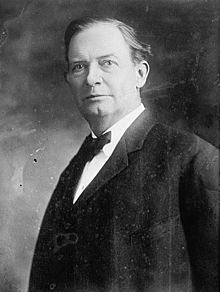Choice B. Randell
Choice Boswell Randell | |
|---|---|
 | |
| Member of the U.S. House of Representatives from Texas | |
| In office March 4, 1901 – March 3, 1913 | |
| Preceded by | Joseph W. Bailey |
| Succeeded by | Sam Rayburn |
| Constituency | 5th district (1901–1903) 4th district (1903–1913) |
| Grayson County Attorney | |
| In office 1882–1888 | |
| Denison City Attorney | |
| In office 1882–1882 | |
| Personal details | |
| Born | January 1, 1857 Murray County, Georgia, US |
| Died | October 19, 1945 (aged 88) Sherman, Texas, US |
| Political party | Democratic |
| Spouse | Anna Marschalk |
| Children | Andrew |
| Profession | Lawyer |
| Military service | |
| Allegiance | Texas State Militia |
| Unit | Fourth Texas Regiment |
Choice Boswell Randell (January 1, 1857 – October 19, 1945) was a U.S. Representative from Texas. He was the nephew of Lucius Jeremiah Gartrell.
Biography
Charles Boswell Randell was born to James L. and Louisa Amantha (Gartrell) Randell in Murray County, Georgia.[1]
He attended public and private schools and the North Georgia Agricultural College at Dahlonega, Georgia, but did not graduate. Instead, he changed his course of study to law and was admitted to the Georgia State Bar in 1878.[2] Randell commenced his law practice in Denison, Texas, in January 1879. He moved to Sherman, Texas, in 1882 and continued the practice of law.
Public service
Randell was elected as a Democrat to the fifty-seventh and to the five succeeding Congresses (March 4, 1901 – March 3, 1913). He did not support women's suffrage and expressed in a letter to women's suffragette leader Ermina Thompson Folsom that his concern was race-based.[3] Randell was the author of the Anti-Graft Resolutions to prevent members of the United States Congress from receiving gifts or fees from anyone with business before Congress.[4]
With pending reapportionment of his congressional district, Randell chose to make a bid for the United States Senate in 1912, rather than run for re-election as a member of the United States House of Representatives.[4] Randell was unsuccessful in his Senate bid, and Sam Rayburn succeeded him in the U.S. House.
After his career in public service ended, Randell resumed the practice of law.
Death
He died in Sherman, Texas, October 19, 1945.
Fraternal memberships
Randell had membership[5] in the following organizations:
References
- ^ Guttery, Ben (2008). Representing Texas: a Comprehensive History of U.S. and Confederate Senators and Representatives from Texas. BookSurge Publishing. p. 125. ISBN 978-1-4196-7884-4.
- ^ Hart, Brian: Choice B Randell from the Handbook of Texas Online. Retrieved 16 July 2010. Texas State Historical Association
- ^ Erminia Thompson Folsom Papers. "C.B. Randell to Erminia Thompson Folsom, November 25, 1910". Texas State Library and Archives Commission. Retrieved 17 July 2010.
- ^ a b Champagne, Anthony; Harris, Dr. Douglas B; Riddlesperger Jr, James W; Nelson, Dr. Garrison (2009). The Austin-Boston Connection: Five Decades of House Democratic Leadership, 1937–1989. TAMU. p. 36. ISBN 978-1-60344-120-9.
- ^ Kestenbaum, Lawrence. "Choice B Randell-The Political Graveyard". The Political Graveyard. Retrieved 16 July 2010.
Sources
- United States Congress. "Choice B. Randell (id: R000042)". Biographical Directory of the United States Congress.
